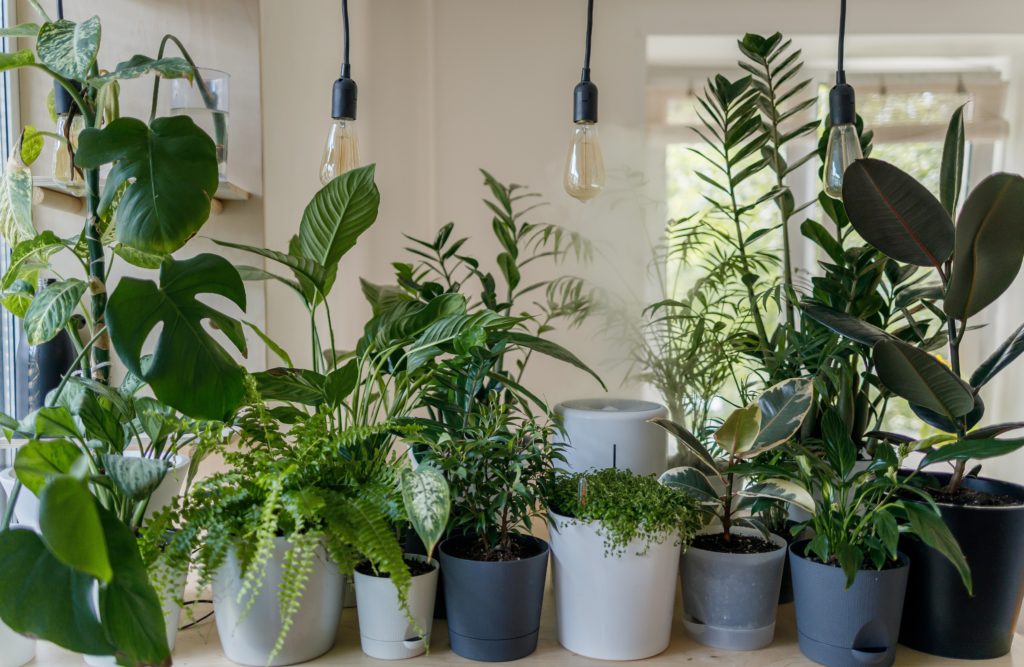Improve Your Health with Indoor Plants

Plants Provide Mental, Physical & Emotional Health Benefits
It is widely known that spending time in nature and green spaces can reduce stress and improve a person’s mood. This can be a challenge during the winter months because of the shorter days, more darkness, the bare landscape and poor weather restricting time outdoors.
When winter weather makes being in nature more challenging, one way to combat this is to bring nature indoors with house plants. Indoor plants provide health benefits all year round and also can be helpful for mental health when green spaces are inaccessible.
How Indoor Plants Improve Our Health
- Plants can improve the air quality in your home. How do they do this? Namely by absorbing carbon dioxide and release oxygen (photosynthesis). Plants also increase humidity by transpiring water vapor through microscopic leaf pores which can be especially helpful during the dry winter months. Additionally, they can passively absorb pollutants on their leaves and on the plant root-soil system.
- They can be calming and help with productivity. A study done at the University of Michigan found that plants have a calming effect, can improve your concentration and increase memory retention by up to 20 percent. Consider adding some greenery to your office or home work space.
- The soil can combat depression. A bacterium in plant soil can trigger the release of serotonin, the key hormone that stabilizes our mood, feelings of well-being and happiness. The bacterium, Mycobacterium vaccae, was first isolated in Uganda and is part ongoing immunotherapy research for multiple ailments.
- Plants can help boost our creativity. Many research studies related to plants have shown an increase in creativity both at school and at work.
- They activate the parasympathetic nervous system. Japanese researchers in 2015 determined that active interaction with indoor plants can reduce both physiological and psychological stress. Mental tasks caused the sympathetic nervous system to activate and blood pressure to rise.
Which Plants Are Best?
Working in nature reduces our cortisol levels, so it makes sense that when we interact with indoor plants, we reap much of the same benefits. Here are a few options for indoor plants that can improve our physical, mental and emotional health.
- Peace Lily: According to NASA, a Peace Lily is one of the most effective plants at filtering harmful toxins and pollutants from the air. They can eliminate mold spores and reduce toxic household chemicals.
- English Ivy is also known for its ability to remove harmful toxins from the air in your home, especially for those suffering from allergies and asthma. Because of this, they can also promote a good night’s sleep.
- Aloe Vera plants can reduce stress and anxiety due to their anti-inflammatory and air purifying properties. Bonus… they are easy to care for and don’t require a lot of maintenance.
- Lavender is used in a plethora of products designed to promote calm. The fragrance of the plant can help reduce stress, anxiety and possibly even mild pain.
- Chammomile is often used in teas to promote sleep. It does this by relaxing the mind and the body to stimulate energy and strengthen mental activity.
- Snake plants are easy to care for and improve air quality by absorbing airborne pollutants that impact mood, sleep and energy.
- Rosemary’s aroma can be powerful, but this plant can lower levels of cortisol (stress hormone). Additional research suggests it may improve cognitive function and reduce anxiety.
- Anthuriums will bloom consistently, adding pink or red blooms throughout the winter month when the skies are often more gray than blue.
